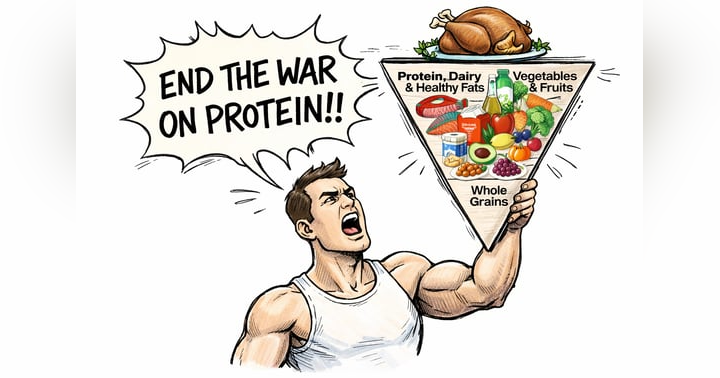Plant-Based Nutrition: Answers to Your Patients’ Most Common Questions
Did you know that plant-based foods require less land, water, and energy to produce? In fact, producing 1 pound of beef requires 1,800 gallons of water, while growing 1 pound of veggies only takes around 39 gallons! In addition to benefiting the environment, colorful plant based foods also provide an array of vitamins, minerals, antioxidants, and photochemical that the body needs to thrive.
If you’ve ever had a patient ask, “But how will I get enough protein?” or “Where do I get B12 on a plant-based diet?” you’re not alone. These concerns are normal, and with a little guidance, you can help your patients feel confident and supported.
Here’s a quick breakdown of common questions and solutions:
How Do I Get Enough Protein?
Protein needs vary, but a good rule of thumb is to aim for a protein source at each eating occasion (aka meal or snack). Think about color, texture, and flavor - ideally, you want a variety of all three! The good thing is, there are lots of whole, plant based, protein rich foods available that are affordable, accessible, and easy to add to your diet.
- For breakfast:
- Scramble tofu instead of eggs
- Add black beans to breakfast burritos
- Stir walnuts, hemp hearts, and ground flax seed into oatmeal made with soy milk instead of water
- For lunch and dinner:
- Pair canned lentil soup with crackers for an easy on the go lunch
- Toss shelled edamame into a stir fry
- Top salads with sunflower seeds,
- Swap rice for quinoa
- Canned beans and lentils can replace ground meat in many recipes - try a navy bean burger or a red lentil Bolognese
- For snacks:
- Trail mix starring nuts and seeds is endlessly customizable and shelf stable
- Kids (and kids at hear!) love nut butter +fruit and high fiber crackers
- Roasted beans (think Bada Bean Bada Boom or Biena brands) satisfy a crunchy + salty craving. They can also be sprinkled on salads or soups as a “crouton”!
What Are Good Sources of Iron, B12, and Calcium?
- Iron: Iron helps with many things in the body, including energy production, immune function, and cognitive development. Excellent plant based sources include dark leafy greens, beans, lentils, and fortified, ready to eat breakfast cereals.
-
-
- Remember, iron and Vitamin C are best friends - so anytime you have one, it’s helpful to also eat the other. Top your lentil bowl with a citrus vinaigrette, top a spinach salad with strawberries, and add peppers to your black bean chili.
-
- B12: Vitamin B12 is essential for energy production, brain health, and red blood cell formation, but it’s primarily found in animal-based foods. For anyone on a plant-based diet, fortified foods like plant milks, cereals, and nutritional yeast, as well as B12 supplements, are your best bet. Regularly including these options ensures your body gets the B12 it needs to thrive!
- Try a bowl of cereal with fortified soy milk, or top a bowl of popcorn with nutritional yeast for a B12 boost.
- Calcium: Calcium doesn’t just keep your bones and teeth strong - it also supports muscle function and helping nerves transmit signals. Some great sources include fortified plant milks, tofu made with calcium sulfate, leafy greens (think kale and bok choy) almonds, and sesame seeds.
- Swap chicken nuggets for roasted tofu, snack on roasted almonds, and add kale and fortified plant milk to a smoothie.
How Do I Make This Eating Pattern Sustainable?
Like any change, it takes time to make it a habit. Start out by adding one extra plant food to your cart this week - you can’t eat it if it doesn’t come home! Next, try making one meal or snack per week plant based. It can be as simple as a PBJ instead of a ham and cheese sandwich at lunch or swapping dairy milk for fortified soy milk. Batch cooking makes it easy to have plant based options available at all times - try prepping a pot of quinoa and stocking up on several cans of beans and several sauces for quick and easy mix and match meals.
Plant-based eating doesn’t have to be complicated or intimidating for you or your patients. By addressing common concerns and offering practical, tailored solutions, you can help them confidently embrace this nourishing and sustainable lifestyle. Small steps can lead to big changes—start with one plant-based meal or snack at a time and build from there!
This article was written and submitted by Alexandria Hardy, RDN, LDN. Owner of Pennsylvania Nutrition Services
https://alexandria-hardy-rdn.clientsecure.me
IG: @pennsylvanianutritionservices
Linked In: https://www.linkedin.com/in/alexandria-hardy-rdn/





